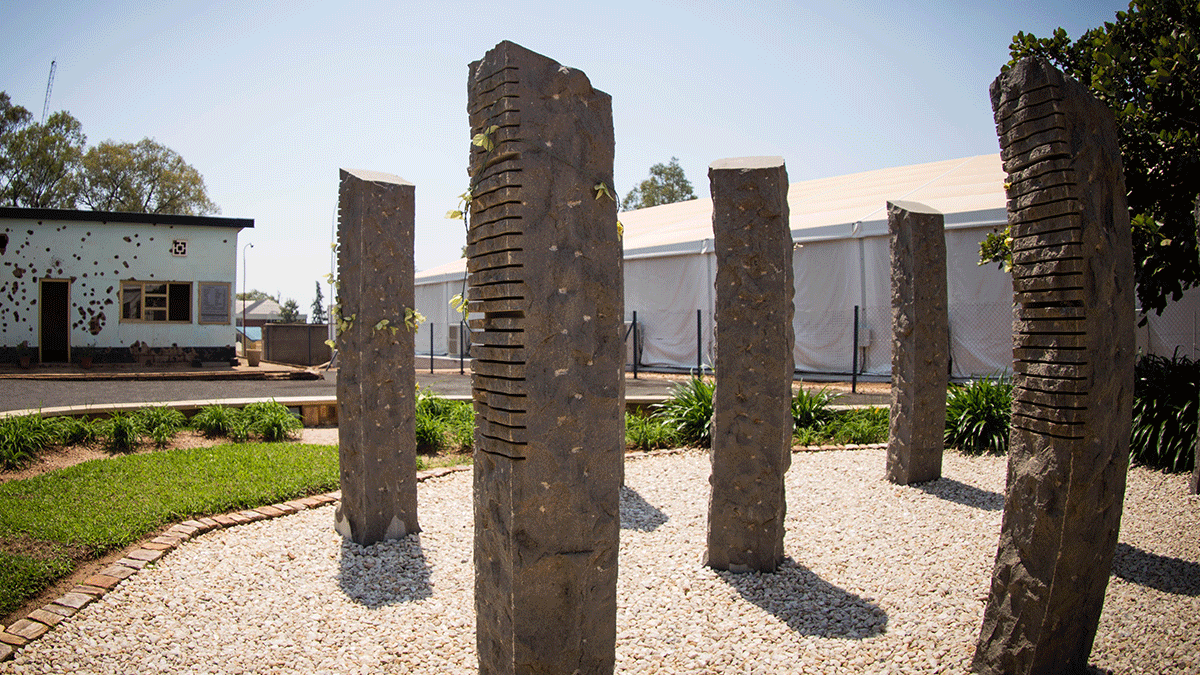Belgian Peacekeepers Memorial Center

Volcanoes National Park Rwanda Africa
August 30, 2023
Gorilla Tracking Permits in Ruhija Region
August 30, 2023Belgian Peacekeepers Memorial Center: Honoring Sacrifice and Remembrance
Nestled within the heart of Kigali lies a solemn ground of remembrance – the Belgian Peacekeepers Memorial Center, also known as Camp Kigali Belgian Memorial site. This poignant site bears witness to a tragic chapter in Rwanda’s history, where ten Belgian United Nations soldiers met their untimely demise while fulfilling their duty to protect Prime Minister Agathe Uwilingiyimana at the onset of the 1994 Rwanda Genocide. This former Rwandan military base, situated in Nyarugenge, Kigali, stands as a solemn testament to their sacrifice.
The Genesis of a Catastrophe
The seeds of the 1994 Rwanda Genocide were sown with the assassination of President Juvenal Habyarimana on April 6th, 1994. This violent act, fueled by long-standing tensions, set off a chain reaction of unimaginable horrors. The attack had been brewing as part of a larger plan by the Hutu extremists to exterminate the Tutsi population, with Prime Minister Agathe Uwilingiyimana as one of the prominent voices opposing the plan. However, the assassination of President Habyarimana triggered the rapid acceleration of these sinister intentions.
Soldiers of Sacrifice: The Final Stand
In the wake of the President’s murder, General Dallaire entrusted a group of ten Belgian Blue Beret soldiers with the solemn duty of safeguarding Prime Minister Agathe Uwilingiyimana at her residence. Tragically, on April 7th, 1994, the Hutu Presidential armed guards stormed her home, capturing the United Nations soldiers and subjecting them to a nightmarish fate. Disarmed and taken to the military base in Kigali, the soldiers were subjected to unspeakable brutality. Four of them were mercilessly killed upon their arrival, while the remaining soldiers courageously fought back before eventually succumbing to the overwhelming force.
A Legacy of Remembrance: Camp Kigali Belgian Memorial
The grisly killings of these Belgian soldiers sent shockwaves through the international community and prompted the United Nations to withdraw Belgian troops from Rwanda. The devastating aftermath was swift and merciless, with violence engulfing the nation. The horrors extended beyond Kigali, resulting in the brutal deaths of an estimated 800,000 individuals within a harrowing three-month span. Many Rwandans sought refuge in neighboring countries, particularly the Democratic Republic of Congo.
Honoring the Sacrifice: Pillars of Remembrance
The Belgian Peacekeepers Memorial Center stands as a testament to these fallen soldiers. Established by the Belgian government, the memorial was inaugurated on April 7th, 2000, serving as a solemn tribute to the sacrifices made. Ten stone pillars stand in quiet reverence, each symbolizing the life of one of the soldiers who had served under the United Nations Mission Assistance for Rwanda. Horizontal marks etched into these pillars denote the span of each soldier’s existence.
Traces of Courage: A Building Preserved
The building where the soldiers made their final stand has been preserved, riddled with the bullet holes that bear witness to their courage. These holes are stark reminders of the Forces Armées Rwandaises’ excessive gunfire, aimed at ensuring that no one survived the ordeal.
A Prime Minister’s Fate: Agathe Uwilingiyimana
Among those lost in the maelstrom of violence was Agathe Uwilingiyimana, affectionately known as Madame Agathe. She was Rwanda’s first and, thus far, only female prime minister, her life tragically cut short by the same forces that claimed the lives of the Belgian soldiers.
Pursuit of Justice: Holding Accountable
In the aftermath of these events, justice sought its course. Bernard Ntuyahanga, an army major during the genocide, was convicted by a Belgian court on July 5th, 2007, and sentenced to 25 years in prison for his role in the arrest and killing of the Belgian soldiers.
Echoes of History: Sites of Dark Tourism
While the Belgian Peacekeepers Memorial Center stands as a somber reminder of the horrors of the past, Rwanda has journeyed towards healing and growth. The nation now stands as a beacon of progress, known for its development, organization, and warmth of its people. Beyond its history of darkness, Rwanda offers a wealth of experiences – from Gorilla treks and wildlife viewing to cultural immersion and serene beach moments by Lake Kivu. Through these diverse offerings, Rwanda beckons travelers to embrace its resilience, celebrate its transformation, and join in its promise of “never again.”
Legacy of Remembrance: Camp Kigali and Beyond
In remembrance of the tragic events that unfolded, the Belgian Peacekeepers Memorial Center continues to stand as a place of reverence and reflection. It joins a mosaic of sites across Kigali and beyond, each a testament to the collective memory and the enduring spirit of a nation that refuses to forget its past

